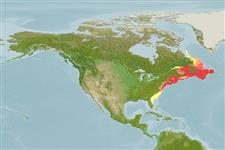Preferred temperature (Ref.
115969): 0.6 - 9.9, mean 5 (based on 189 cells).
Phylogenetic diversity index (Ref.
82804): PD
50 = 0.5078 [Uniqueness, from 0.5 = low to 2.0 = high].
Bayesian length-weight: a=0.01380 (0.01040 - 0.01833), b=2.98 (2.90 - 3.06), in cm Total Length, based on LWR estimates for this species (Ref.
93245).
Trophic level (Ref.
69278): 4.5 ±0.3 se; based on diet studies.
Resilience (Ref.
120179): Low, minimum population doubling time 4.5 - 14 years (K=0.06-0.1; tmax=30; Fec=300,000).
Prior r = 0.08, 95% CL = 0.05 - 0.12, Based on 1 full stock assessment.
Fishing Vulnerability (Ref.
59153): Very high vulnerability (77 of 100).
Climate Vulnerability (Ref.
125649): Moderate vulnerability (41 of 100).
